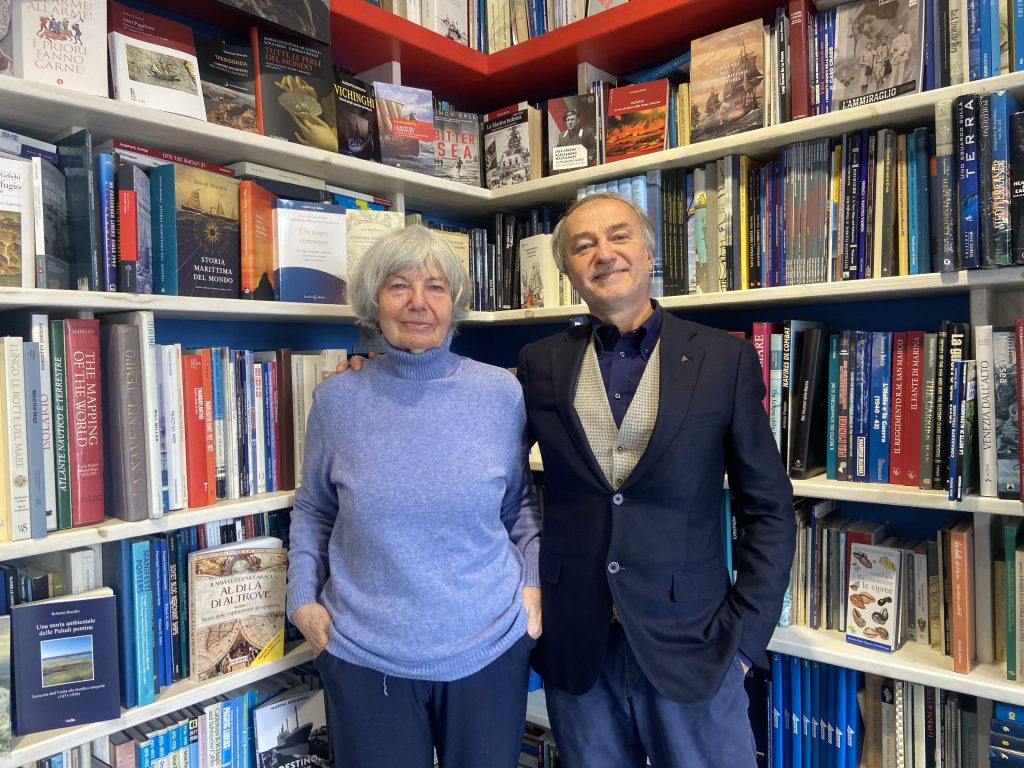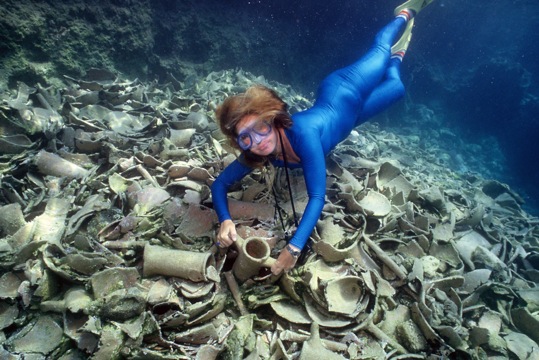A sailor looks straight-ahead, hands-on hips, while welcoming visitors to a place immersed entirely in blue. It’s the giant poster of Corto Maltese, the famous protagonist of Hugo Pratt’s comics, and it’s located on a door behind the counter. On the shelves, there are models of sailboats, wooden or tin lighthouses, striped in blue or red and miniature mermaids scattered all around the shop. Then there are books about sharks, shells, islands, marine animals, pirates, adventures of great writers among the waves. The ocean comes to life in the streets of Rome, just a few steps from Circo Massimo, thanks to Il Mare bookstore, founded by Giulia D’Angelo, one of the first Italian female divers, which has been led for years by Marco Firrao, her son.
On their website, this place is defined as an emporium, “a unique reference point for all lovers of recreational and competitive boating, for enthusiasts of underwater exploration, freediving, and scuba diving.” To explain what is meant by ‘sea culture,’ Marco draws inspiration from Siamo figli dell’oceano by Michel Odent, a French doctor, a recently released book: “He says: ‘We call our planet earth, but we should actually call it ocean, because 70% of the world’s surface is composed by water and it is most likely that the first man got nourishment from the marine shores, being first a fisherman and then a hunter.’ This is Odent’s opinion, but it’s probably true. People don’t realise how many things exist, in the publishing world and beyond, that happen on the sea, for the sea, through the sea.”
The shop opened in 1975 in Piazza Farnese: “Twenty square metres of an all-blue bookstore.” In 1977, Giulia and Marco moved to Via Ripetta, then to other places near Piazza del Popolo, before finally moving to Via Leon Battista Alberti, two years ago.
The love for the ocean was passed down to him by his father, Luigi Firrao, known as ‘Zizzi,’ an experienced diver who died in an accident during a dive in Porto Ercole in 1975. “This world has remained with us forever because once you discover the sea, you never leave it. All this merged with the great passion I’ve always had for books. At home, I have a library spanning four generations. It starts from the 1700s, so it really is a family thing,” reveals the owner.
Folco Quilici, a filmmaker, photographer, and writer, is considered by the founder as the ‘guardian’ of the bookstore. “He was a great figure who wrote, filmed, and told stories of the sea. He made us love and dream of Polynesia in his films. He became the godfather of this place because I loved him, sought him out and he had fascinated me. I went to talk to him about going to Polynesia, underwater, in the early ’70s. Then he started coming to us regularly because I used to invite him to present books,” says Giulia.

The founder recalls her past in the Italian Communist Party (PCI) with her partner ‘Zizzi’ and the difficulties they encountered in combining their passion for diving with their political commitments. She recounts that they were expelled because they tried to “always be on the side of students and workers” and agreed with the ideals of il manifesto, a communist newspaper founded in 1971 by a group of dissident intellectuals from the PCI, where they were hired shortly after. “We were dissenters, we represented the left of Italian communism at that time.”
“Pietro Ingrao [leader of the internal left of the party] withdrew what he had said at the beginning and even voted in favour of expelling the comrades from il manifesto: Aldo Natoli, Luciana Castellina, Luigi Pintor, Valentino Parlato and Lucio Magri. I had made a bet with Luciana and Valentino: ‘They’re going to expel me and ‘Zizi’ before you all, trust me.’ The general line was to get us kicked out, avoiding leaving the PCI by personal decision. Needless to say, I won the bet, and they had to offer us lunch,” she adds with a smile.

Giulia also mentions an episode that involved her when she was no longer part of the party: “While I was working, on March 8th, some colleagues from the newspaper came to tell me: ‘You are on all the walls of Rome!’ Basically, the PCI had put up a poster with my photo saying ‘being a woman, being a communist.’ Thing is that they had already expelled me long before.”
The image was captured during the general strike of construction workers in 1969. She had taken to the streets with a red flag to protest and met a group of trade unionists from Emilia-Romagna, who tore it from her hands and threw it to the ground. This happened because it was a union protest and, according to them, red symbols could not be brought. “There weren’t even the hammer and sickle of the PCI,” says the founder. A photographer immortalised her while, with the flag rolled around her body, she had her gaze lost because she couldn’t find her companions. “The Communist Party evidently liked this photograph, printed the poster and put it up everywhere. I wanted to sue them, but of course, I didn’t.”
Giulia and Marco’s bookshop is often involved in many cultural events, organised inside or outside the store. “We’ve done great things, such as an event in Piazza del Popolo, Amor di mare, creating a play on words because if you read Rome backwards [in Italian] it means ‘love.’ We also collaborated with the National Research Council‘s boat, the Bannock, which has now been demolished. It was a floating library that toured all of Italy,” says Marco.
“More than just a bookstore, we have tried to make Italians love the sea in every possible way and we did it because we are passionate, we believe in it. Culture is important, without it, you can do nothing,” concludes the woman.

